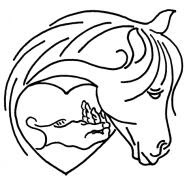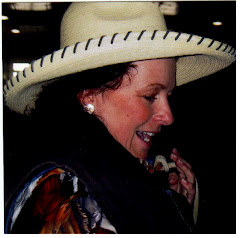
The Essence of Horsemanship
By Sherry Jarvis
Heart in Your Hand Horsemanship LLC
Good horsemanship is a lifetime pursuit. We are aware that timing, feel, and balance are three words that describe good horsemanship and most of us are still in pursuit of perfecting these three elements. No matter how good we are, we all know that if we spend very much time with a horse things don’t always go as planned or as we would like them to. No amount of good intentions, will power or self control will stop us from becoming disappointed, frustrated, fearful, or angry when things fall apart with our horse. What will change our way of being is learning to see the horse as a horse, perfect just the way that God created it.
Good horsemanship starts in your mind. Ray Hunt said, “Let your Idea become the horse’s Idea”…and “fix it up and let him (the horse) find it”. He also said, “If the horse is right on his feet he’ll be right on his head”. Ray’s thoughts and words are the essence of good horsemanship. But how do every-day people like you and me get there?
I have been trying to learn feel, timing, and balance for 40 years now and to teach it to others for about the past 10 years, because apparently these three things are all you need in order to become a good horseman. However, even after many years these are still concepts that are not easy to do or to teach. Even though good horsemanship is not always an easy task the rewards and benefits are worth the blood, sweat, tears, and money we pour into this passion we call horsemanship. Just how does one go about acquiring good horsemanship?
The Essence of Horsemanship is composed of seven things
I believe that the essence of horsemanship is composed of seven things:
1. A calm projected, quiet yet strong, and fair confidence that gives humans leadership in the equine order of things.
2. Sensitivity to the animals means of communication, most of which involves touch and body language.
3. Patience, patience and then more patience with lots of time. Don’t be in a hurry!
4. Strategic planning as to how to teach the horse to do what is desired.
5. Enough balance, athletic ability, bio mechanical knowledge and conscious control over your body that you do not impede the horse or send random or meaningless signals.
6. A sincere and honest desire to join with the animal's feelings.
7. Letting go of our agenda, at least for a little while.
Being fixated on a big agenda causes humans to have narrow vision and limited ability for being flexible, tolerant, empathetic, and patient. Not being fixated on a specific agenda allows humans to be open and more able to adjust to variations in whatever a particular situation produces. Giving up agenda gives the human a better view of the bigger picture. It removes limitations and blocks to progress and allows more opportunity for success. Giving up our agenda offers a rare glimpse of freedom to the horse and the human. Empathy is a huge key and essential element to successful relationships of all types, including with our beloved horses.
Humans need to learn flexibility and creativity when training horses. I love this quote by Betsy Shirley (Buck Brannaman's foster Mom),"Blessed are the flexible, for they shall not get bent out of shape." No one standard method will always work with every horse. Each horse will develop as an individual and will react differently to the same stimulus.
“The balance of human rules and horse rules will depend on the particular horse and human involved. That's why we can't treat all horses in the same way and expect the same results. Recipes have an allure because of their simplicity, but they will ultimately
fail because of their lack of specificity.” Greg Brass
Knowing what to do, how and when to do it (and more importantly, when to stop doing it) is bound together within feel, timing and balance. If you release the pressure at the wrong time, you have lied to your horse. Horses that have been lied to repetitively are easy to spot. They are the ones who:
- throw their heads up instead of softly backing up.
- hesitate or refuse to enter a horse trailer, the arena, or go over a jump
- step away or kick at the Farrier instead of lifting the desired foot.
- won’t stand still for grooming, saddling, mounting
- push through any kind of pressure, or crowd people
- avoid being caught
- buck when asked to go forward, etc….
Yes, I have had horses like this, we all have. The good thing is I have also had horses that will do just about anything I ask of them with an amazing willingness. Horses that desire to be ridden are a joy. You can easily spot these horses because they:
- are easy to catch.
- will stand still untied for saddling or just about anything else within reason.
- stand quietly to be mounted and they may even step over to the mounting area to pick you up.
- respect your space and respond willingly to all your suggestions when understood etc….
I think horses are more intuitive than we give them credit for. They can understand your intent….your THINKING. They can feel a temper, anger, frustration, all of which they do not respond very positively to. Therefore we should always remain empathetic.
Feeling what others are feeling is called empathy. Horses are naturally and always empathetic. Empathetic responses help animals to become bonded, develop trust, respect and create loyalties. If we have empathetic relationships with our horses they truly become our trusted companions and we become that to them as well. If this sort of relationship is established, generally the horse will really try as hard as it can to comply with the wishes of the human because the human has become a great herd leader for the horse.
Horses should not be accused of doing anything personally to a human. It's only a horse, and does not think to intentionally cause a human to have problems, spoil a humans day, make a human look bad or ever have any such inclination to personally do something to a human.
“What appears innocuous is insidious, but there is no bad intent in the horse. It's nothing sinister, they're attempting to fill the void. Horses relate to each other with a set of rules. Some of the rules are hard-wired in their DNA and some are learned. But the rules give them an ordered understandable way to live in their environment. It makes life more manageable. When humans enter into the horse world there needs to be a negotiation to determine the rules that will apply.” Greg Brass
All behavior we see in our horses that we call bad or stubborn is born out of fear or confusion within the horse. Horses will not act against their good herd leader. After all, it is the leader of the herd that helps assure the survival of the herd.
I think one answer to better horsemanship is our willingness to become empathetic with our horses. Greatness in humanity seems in part to always contain the quality of empathy. When empathy is combined with compassion and kindness huge strides are made towards a better existence for all. With our horses, if we can add the ingredients of great equestrian skills, wisdom of the mind of the horse and excellent leadership, then high levels of success are assured. Think about becoming an empathetic horseman and, at least attempting to feel what your horse is feeling. You will be amazed at how much closer you will become with your horse and how much closer that horse will become with you.
So the next time you are working with your horse you may want to think about these principles:
before you blame, examine selfbefore you speak, listen
before you demand, suggest
before you respond, watch
before you ask again, wait
before you block, offer an out
before you drill, be creative
before you get angry, preserve dignity
before you take a hold, let go
before you brace, breath
before you say no, know the right answer
before you yell, whisper
before you go over board, stay balanced
before you speed up, slow down
before you ride, pray
I would like to close this article with one more quote from my horseman friend Greg, “Once humans recognize that they aren't particularly special, that they are merely different, then they can relate to horses as different equals that together have the ability to be greater than themselves individually. A human's greatest obstacle to being a good horseman is ME.”
Happy Trails,
Sherry Jarvis













Another great article to read for. Horses can discern what’s in your heart, if you are nervous with him then he’ll get nervous too. I just learned that from Saltriver Horsemanship. By the way, I love your principles’ list.. before you ride, pray. Thanks for sharing!
ReplyDelete